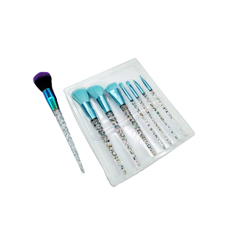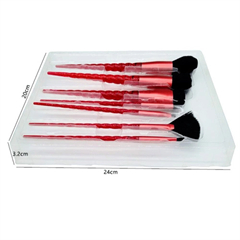Choosing the right wire brush for your specific task is essential to ensure efficient and safe cleaning, surface preparation, or maintenance. Here are some factors to consider when selecting the appropriate wire brush:
- Type of Bristles:
- Steel Bristles: Steel bristle brushes are the most common and versatile. They are excellent for removing rust, paint, and stubborn contaminants from metal surfaces. Stainless steel brushes are corrosion-resistant and suitable for use in wet or humid conditions.
- Brass Bristles: Brass bristle brushes are softer than steel and are ideal for cleaning softer metals like copper or brass. They are also less likely to scratch or damage delicate surfaces.
- Nylon or Synthetic Bristles: Nylon or synthetic bristle brushes are less abrasive and are often used for cleaning sensitive surfaces like wood or plastic. They are also used for light-duty cleaning tasks.
- Brush Shape:
- Hand Brushes: These are small, handheld brushes with a wooden or plastic handle. They are suitable for detailed or precision cleaning and are often used for small-scale tasks.
- Wheel Brushes: Wheel brushes have a circular shape and are mounted on tools like angle grinders or bench grinders. They are efficient for larger surface areas and aggressive cleaning tasks.
- Cup Brushes: Cup brushes have a cup-shaped design and are attached to a power drill or similar equipment. They are useful for reaching into corners and tight spaces.
- Wire Brush Wheels: These are large, wheel-shaped brushes commonly used in industrial applications. They cover a broad area and are ideal for heavy-duty cleaning and surface preparation.
- Bristle Density and Length:
- The density and length of the bristles determine the aggressiveness of the brush. Shorter, denser bristles are more aggressive and are suitable for heavy-duty tasks, while longer, less dense bristles are gentler and better for lighter cleaning.
- Handle Length:
- Consider the handle length for hand brushes. Longer handles provide better reach, while shorter handles offer more control for detailed work.
- Safety Precautions:
- When choosing a wire brush for power tools like grinders or drills, ensure it’s designed for the specific tool and that it can handle the RPM (revolutions per minute) of the tool.
- Always wear appropriate safety gear, including gloves and safety goggles, when using wire brushes to protect against flying debris and bristle breakage.
- Material to be Cleaned:
- Consider the material you’ll be cleaning or preparing. Different materials may require specific types of wire brushes to avoid damage or achieve the desired results.
- Task Requirements:
- Determine the nature of your cleaning or preparation task. For heavy rust removal or aggressive cleaning, you’ll need a more robust brush, while a softer brush may suffice for light surface cleaning.
- Maintenance and Care:
- Some wire brushes are designed for single-use or disposable purposes, while others are built for durability and can be cleaned and reused. Consider how frequently you’ll be using the brush and choose accordingly.
- Budget:
- Wire brushes come in a range of price points. Consider your budget while also keeping in mind the quality and durability of the brush. Investing in a higher-quality brush may save you money in the long run.
- Manufacturer’s Recommendations:
- Always follow the manufacturer’s recommendations for the specific wire brush and its intended use.
Taking these factors into account will help you choose the right wire brush for your cleaning or surface preparation needs, ensuring efficient and safe results.














